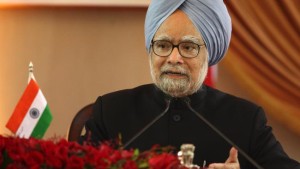Women have the power to put India on the course to a green sustainable future, specifically, poor rural women working in the agriculture sector.

India’s economy is predominately agrarian and increasingly female dominated. 80% of all economically-active women are employed by the agricultural sector.
As men are migrating to urban areas for employment opportunities, partly as farming is now a more risky business, the women are staying back and keeping the homes and farms afloat.
Aditi Kapoor from Alternative Futures has labelled this the ‘feminisation’ of the agriculture sector, with a 7.6% increase in the proportion of workers in the sector in India being women over the last two decades.
According to the Government’s own assessment, the agriculture sector is facing serious risks due to the current impacts of climate change: increasing temperatures, erratic rainfall patterns and a higher number and severity of floods, droughts and cyclones.
A number of studies project that unless India adapts to the impacts of climate change, there is a probability of 10-40% loss in crop production in India by 2080- 2100 due to global warming. Economic growth, food security and fighting poverty stand to lose.
Women are at the front line of these impacts. Not only due to their involvement in the agriculture sector, but also because they face the burden of the household tasks such as fetching water, fuel wood and fodder.
As these resources become scarcer, they struggle more to provide for their families.At the same time they often face more restricted access to key assets such as land, money or political voice, than men. Different gender roles and status thus shape people’s opportunities and capacities to adapt to the impacts of climate change.
As agricultural work has become increasingly ‘women’s work,’ land ownership has been increasingly masculinised. In terms of both the number of landholdings, and the size of the land, there is a growing gender gap. This has serious implications for women’s access to credit to invest in adaptation technologies or set up new sources of livelihood. In some cases it also limits their ability to participate in local decision-making bodies and support systems.
As climate change makes its impact felt in India, the central and State Governments are formulating their plans and policies for adapting to these new environment. However, for these to be successful, the specific opportunities and challenges that women face in adapting to the impacts of climate change need to be understood and addressed.
For example, organic farming is being promoted by many State Governments in India for both environmental and food security reasons. However, what is often ignored is that it requires more manual labour, and this extra burden falls predominately on women. At the same time, women have less access to the support and inputs being offered by the Government to transition to organic farming, mainly due to the lack of land rights. Without specific efforts to promote labour-reduction measures for organic farming, and work through women’s groups to promote them, the policy could fail and/or have negative consequences for women empowerment.
Aditi Kapoor has shown that India’s climate plans and investments are not in general ‘gender aware’. For example, her in-depth study of four State Action Plans on Climate Change reveals that there is little or low priority given to women agriculture. Even when efforts have been made, for example by setting a target of 33% female participation in training programmes, they reveal ignorance about the reality of women’s role in the sector.
CDKN has commissioned a short documentary that gives a voice to these ‘missing’ women in India’s climate plans. Rather than portraying women as victims of climate change, it shows how women should be considered and supported as positive and crucial agents for delivering climate compatible development.
The film’s director, Krishnendu Bose, gained the trust of a group of local women in the hill state of Uttarakhand, and trained them in basic filmmaking techniques. The Nayi women then told their story about how women can be leaders in the fight against climate change.
The women have benefited from a State Government initiative to set up ‘Van Panchayats’ (forest community governments) which bring together forest department officers and villages to jointly manage village forests. A third of the members of the executive committee and half of the general body members are mandated to be women.
“In 2005, after the policy came in, we together with the panchayat (village government) and sarpanch (village leaders) made our own rules and regulations….cutting grass would be 500 INR fine (GBP 5)…chopping green leaves, 100 INR fine (GBP 1) … and the defaulting person deposits her sickle, and we auction it”
“This way, we women protected our forest”
The women have also formed a cooperative, taking knowledge from local NGOs and gather dry leaves to use for organic farming. The products are then shared within the community, contributing to food security. At the same time, they are bringing to life traditional farming practices as they have seen how commercial farming has been affected by climate change.
These strong, pro-active women are taking charge of their community.
“The 2005 rule said that a woman could become the sarpanch (village leader). The men protested against this. But, a women sarpanch was elected. This is good for the forest. And we women benefit from it. Now even men have started supporting us.”
Their message to the government is that this is just the first step. For true empowerment, other power hierarchies must be tackled, such as providing women with land ownership. Enhancing such capacities will help women, as well as the rest of their communities, cope and better adapt to climate change and fight environmental degradation.
By Elizabeth Gogoi (CDKN) (Published courtesy: Lead International)
